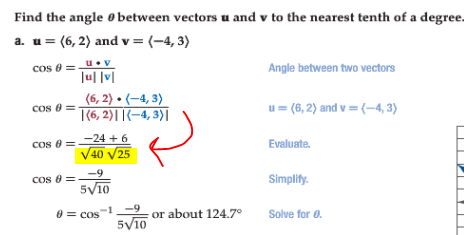Angle between two vectors?
I'm not really sure if I'm overthinking this or not, but how does the change highlighted in the picture occur? I'm looking for the work that happens for it to become radical 40 and 25, essentially. Thanks!

I'm not really sure if I'm overthinking this or not, but how does the change highlighted in the picture occur? I'm looking for the work that happens for it to become radical 40 and 25, essentially. Thanks!
2 Answers
Its the result of using the Pythagorean Theorem,
Explanation:
What is happening in the above figure is that the magnitude of the vector is being calculated.
The
The Pythagorean Theorem can be used to find the hypotenuse of this triangle, which is the total magnitudinal distance. The only thing that we must be aware of is that the magnitude will always be a positive number, since we are squaring both
So, if
Where
Using this formula, we can plug in the two vectors and see that they match up to what is shown in the document:
The radicals come from the computation of the magnitudes.
If
Explanation:
Given:
Given:
Starting at the equation:
The numerator becomes -18:
Which divides evenly by 2:
The
The above is the simplification in slow motion.

